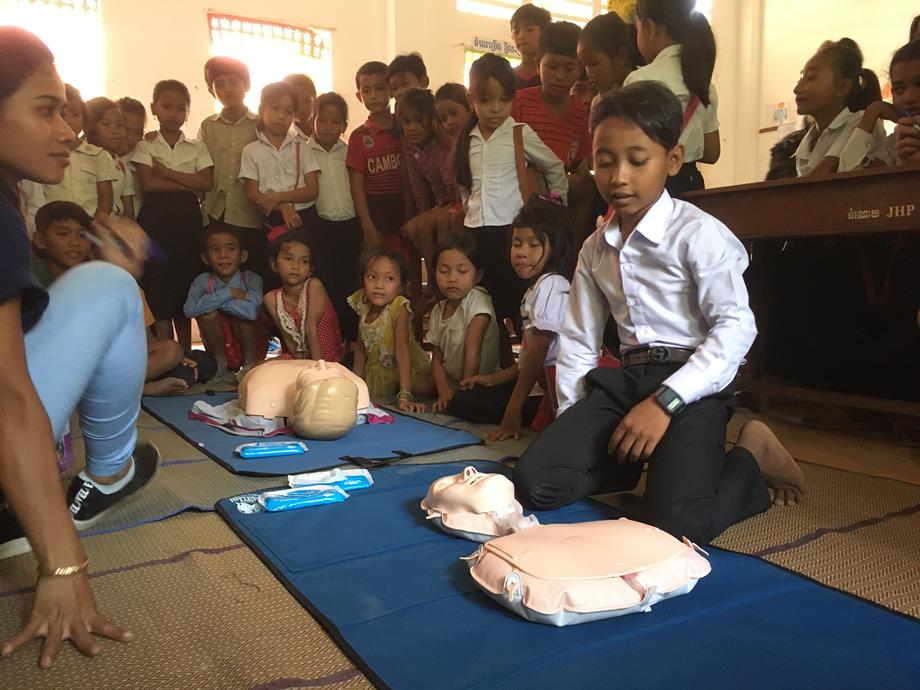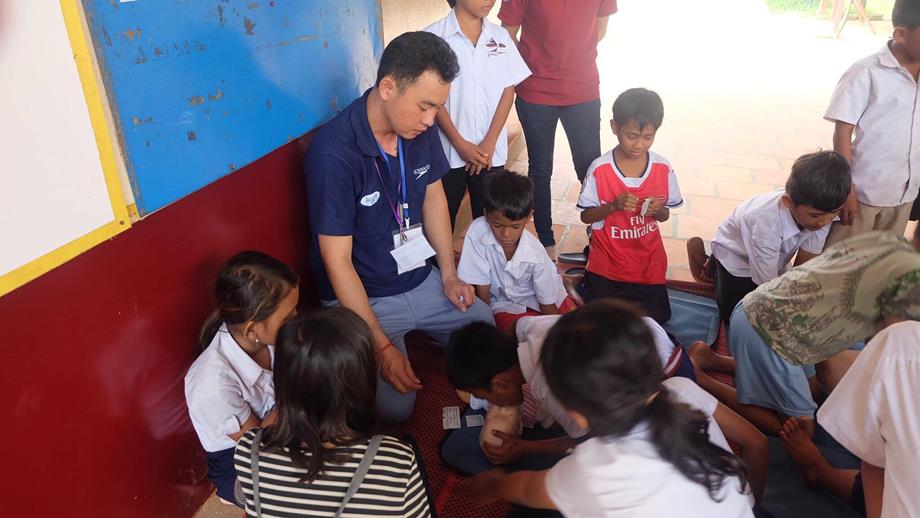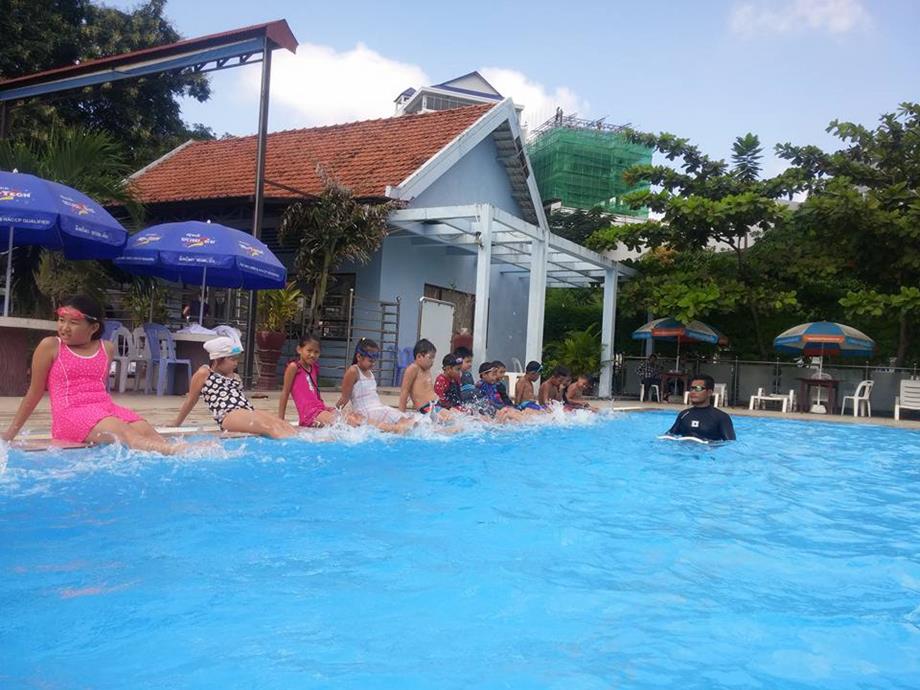Safety When It Matters (SWIM Cambodia)
Case Study
Country: Cambodia
Author: Conrad Foote
Organisation: Safety When It Matters (SWIM Cambodia)
Aims
To train and equip Cambodian volunteers to educate children and their communities in water safety, safe rescue and resuscitation skills, with the aim to stop child drowning in Cambodia.
Background
Drowning deaths among children are highly prevalent in Cambodia, with approximately 2,000 Cambodian children dying from drowning each year. This is equivalent to six children dying from drowning every day, or one child every four hours. More Cambodian children aged 1 to 17 years die from drowning than from any other single cause, at a rate of 35 per 100,000 population. In 95% of fatal drowning cases for children aged above 4 years, the child could not swim.
Cambodia is yet to have a significant drowning prevention programme in any province. A qualitative study was completed in 2016 to gauge community perception around childhood drowning. This was valuable in informing the design of an appropriate drowning reduction programme for the local context, as well as developing an understanding in local cultural beliefs around drowning.
Intervention
SWIM Cambodia teaches water safety and CPR to children from 8 years old and adult caregivers. As rates of drowning are similar across Cambodia, the programme is available in all provinces where effective local partnerships have been established. SWIM Cambodia sits on the Aquatic Survival Programme (ASP) steering group, collaborating with organisations including Nile Swimmers, Royal National Lifeboat Institution and The Royal Life Saving Society. The ASP has been specifically designed for use in low and middle-income countries. Through the present programme, Cambodian trainers and advisors have worked in adapting the ASP manual to the Cambodian context.
References
Foote, Community perception of childhood drowning and prevention in a semi -urban district of Cambodia: A qualitative study (PDF 2,037KB)
RNLI et al., Aquatic Survival Programme Manual (PDF 1,115KB)
Further information/resources
WHO, Preventing drowning: an implementation guide, 2017 (PDF 2,691KB)

Results
In 2016/17, six volunteer SWIM Cambodia trainers attained qualification, they then went on to teach 177 children and 99 adult caregivers water safety, rescue and resuscitation skills. In 2017/18 a further 15 volunteer SWIM Cambodia Trainers attained qualification, and have since taught 199 children and 113 adult caregivers.

“When I was young, two little girls lived next door to me. I saw the two drown in my village in the water outside their house, it was shallow water. I saw old people carry them upside down and smack their back. They both died. I want to help the people understand how to stay safe with water and show how to do good CPR.”
Challenges
A key programme challenge was identifying partner organisations which had enough capacity to teach large cohorts of children as part of their existing services. Some partners had very limited capacity, resulting in trainers spending months without teaching.
Without regular practice, new educators can start to lack confidence. Another challenge has been a lack of funding. In order to up-scale the current programme, it may be necessary to employ staff to manage the training of multiple cohorts of volunteers throughout Cambodia. Funding is also needed to be able to safely begin teaching survival swimming skills to children.

Lessons learned
Safety When It Matters (SWIM Cambodia) have concentrated initial efforts into building partnerships, while training and equipping volunteers who have become passionate about drowning prevention. Through the programme other organisations, which already have a good relationship with governmental ministries in Cambodia, have been trained in water safety. However, in order to upscale the programme, it may be necessary for SWIM to register as an International Non-Governmental Organisations (INGO).
This will create an opportunity for a close working relationship to be established directly between SWIM and governmental ministries. With a lack of funding in drowning prevention in low-and-middle-income-countries, we have learned the importance of multi-sectorial and multi-theme collaboration.Replicability
Understanding context is extremely important. Therefore, prior to establishing any programme, it is necessary to conduct a qualitative study to understand local perceptions of drowning and its prevention. This is also a useful approach for learning about existing drowning prevention efforts in a local setting.
The Aquatic Survival Programme (ASP) manual has been used in African and Asian countries and was adapted for use in the Cambodian context. However, it has been vital for SWIM Cambodia trainers to inform programme and manual design. Taking time to develop educational messages which address local culture, context and language is vital.Sensitivity is required when teaching and challenging people’s beliefs around life, death and drowning. CPR is often a new concept to many programme participants and because of this, trainers must first sensitively discuss traditional resuscitation and the lack of evidence in successful resuscitation attempts.
One recommendation for an international person starting a similar project would be to train local leaders and volunteers who will then quickly become the face of community drowning education. In the early stages it is important to take the time to effectively trial and practice the program; furthermore, it is important to make the time to listen to feedback from local trainers.
In order to build a sustainable model, community educators and trainers should be nationals as foreigners are less likely to have an enduring commitment to the program.
“Many people do not know the water is a risk for them. In Cambodia, a lot of people die from drowning each year and most who drown are small children because sometimes they are adventurous and because we use outside [open] water in everyday life. My hope and want, is to see all the children and adults in Cambodia get knowledge about water safety and safe rescue for in around the water. I am so happy to being a SWIM Cambodia trainer. I hope that the knowledge me and my teammates have can be shared to the people who are risk from the water.”
Step 5
Set objectives and interventions